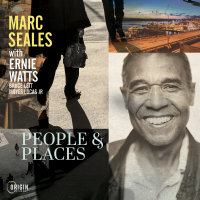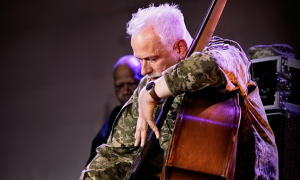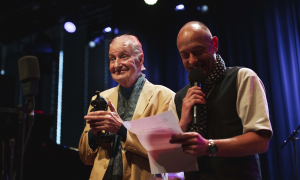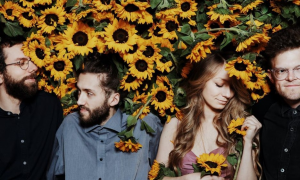Home » Jazz Articles » Profile » 20 Seattle Jazz Musicians You Should Know: John Bishop
20 Seattle Jazz Musicians You Should Know: John Bishop

The high level of musicianship, mentorship, variety, and general hanging that was the norm around here, is the keystone to what the jazz life is to me.
—John Bishop

Ray Charles
piano and vocals1930 - 2004

Quincy Jones
arranger1933 - 2024

Ernestine Anderson
vocals1928 - 2016

Jelly Roll Morton
piano1890 - 1941

Joe Venuti
violin1903 - 1978

Larry Coryell
guitar1943 - 2017

Julian Priester
tromboneb.1935

Randy Brecker
trumpetb.1945
With this series of features, I will introduce you to twenty jazz musicians currently living and working in Seattle. It is not to be seen as any sort of ranking, it has no positional value in that regard. It is simply an effort to introduce the jazz world at large to the vibrance and innovative nature of the jazz scene in and around the jewel city of Seattle, Washington.
5. John Bishop
To say that
John Bishop
drumsb.1959
Raised in Eugene, Oregon, it didn't take Bishop long upon arriving in Seattle to recognize that something truly special was happening in the city. He witnessed the veteran presence, and a wellspring of young, talented players such as himself on the scene. This identity with Seattle would accompany him down his path to becoming an internationally recognized drummer, and further down the road, operating the highly regarded Origin Records label.
In July of 2018, Bishop told All About Jazz columnist Jakob Baekgaard, "I'm afraid I don't have much choice for the Seattle branding. Diving head first into the scene when I was 22, the players and sounds of Seattle are my life-blood, so it's impossible to escape. Still vivid is the 1981 concert I heard, my first night in town, with

Art Lande
piano
Gary Peacock
bass, acoustic1935 - 2020
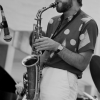
Denney Goodhew
saxophone, alto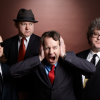
Dave Peterson
guitar
Ernestine Anderson
vocals1928 - 2016

Hadley Caliman
saxophone1932 - 2010

Buddy Catlett
bass, acoustic1933 - 2014
Bishop took advantage of opportunities to play with prominent artists early on, performing with the likes of

Lee Konitz
saxophone, alto1927 - 2020

Benny Golson
saxophone, tenor1929 - 2024

George Cables
pianob.1944
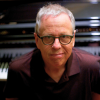
Kenny Werner
pianob.1951

Jeff Johnson
bassb.1954

Rick Mandyck
saxophone
Jay Thomas
saxophone, tenorb.1949

John Stowell
guitar, electricAs far back as 1987, Bishop has performed with the trio
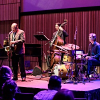
New Stories
band / ensemble / orchestra
Marc Seales
pianob.1963

Doug Miller
bass
Don Lanphere
saxophone1928 - 2003

Ernie Watts
saxophone, tenorb.1945
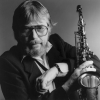
Bud Shank
saxophone1926 - 2009

Mark Murphy
vocals1932 - 2015
In 1997, Bishop formed the jazz label Origin Records (named Jazzweek's 2009 label of the year), and Originarts, a graphic design and CD production company, with the aim of increasing the exposure of creative artists and their music. In partnership with drummer/composer

Matt Jorgensen
drumsb.1972
"I don't consider myself to be a businessman, I consider myself to be a researcher, and I'm just doing stuff that's related to music. It just happens that the label works within that realm. I just feel like I'm a musician, doing my thing and it happens to have something to do with putting out records and all that stuff," he observes.
With so many independent recordings being released in present times, Origin has offered a community of prominent musicians, and the ability to distribute to radio stations, journalists and media outlets with the requisite respect the label has earned over time with those entities. Bishop literally has his imprint on every label release-each recording features one of his original graphic cover designs. The identifiable look of the product accompanies the unique musical signature the label has developed through its international presence and outreach. One could draw a parallel with ECM records in terms of original presence.
Much of Bishop's innovative qualities have been most clearly identified by his presence in groundbreaking trios. Within the trio form, the communicative thread guided by intuition allows a unique equal partnership that releases the participants from more traditional roles. Simply put, everyone is just playing music. Bishop and bassist Johnson met up upon Johnson's arrival in Seattle in 1989, and have since formed a partnership of two musicians who truly "sound like themselves." Playing in trio with piano royalty such as

Jessica Williams
piano1948 - 2022

Chano Dominguez
pianob.1960

Hal Galper
piano1938 - 2025

Bill Evans
piano1929 - 1980
Bishop's musical compatibility with Johnson was the key factor in playing with Galper in the first place. Johnson had just spent 10 years in his trio, along with drummer Steve Ellington. Following the dismantling of the trio, Johnson stayed in touch, occasionally sending him recordings of projects going on in Seattle. Among them were recordings with guitarist Stowell that somehow piqued Galper's interest. It prompted him to visit Seattle, and a chance encounter in Bishop's living room.
"He flew out and played in our living room. We played maybe 12 bars and he said, 'Let's just try this without, you know, just play it, forget the time. Think of this as just rubato.' So we did that for an hour and a half or so. The next day we recorded the record, and then basically never talked about it ever again," recalls Bishop. "So the idea was to understand the concept and then just go. That's what's kind of amazing about all of that, anything went. So we would just start playing, and then afterwards there was no going back. Never have for 13 years."
In that sense, he became a catalyst to what Galper was looking for, and along with the trailblazing work of Johnson, became the missing piece to his rubato vision. That relationship over 13 years has resulted in seven groundbreaking albums. All but one are in the trio format, including the most recent release, The Zone (Origin, 2019), recorded live in 2016 in Edmonton. The previous outing, Cubist (Origin, 2018), features tenor saxophonist

Jerry Bergonzi
saxophone, tenorb.1947
Trying to convey this open and interpretive concept of time in words is profoundly difficult, if not impossible. It certainly feels different to the listener. When asked how it feels to play, after playing within a more linear sense of time, Bishop responds simply, "Exactly the same."
Still, the conceptual approach is undeniably abstract, as one would believe the musician's approach would be. Bishop describes it as, "Getting in touch with the syncopation, and then having that become the centerpiece of your thing."
"So that's it, there's all this other stuff that goes on in the world, and you talk about time changes, but actually, time doesn't change. We're still exactly in that 4/4. If I'm playing straight up rock and roll, or playing with Hal, I'm thinking basically the same. I'm hearing within that. It just happens that these are the notes I need to play at this moment in time. I'm hearing these drawn out phrases that are built on syncopation," he explains.
2020 has been a challenge for Bishop, like everyone else. Origin keeps ticking, with recordings continuing to be made, especially considering the absence of live performance during the world-wide pandemic. In January, pre-Covid 19, Bishop entered the studio with his band
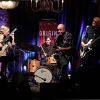
Scenes
band / ensemble / orchestra
John Coltrane
saxophone1926 - 1967

Dexter Gordon
saxophone, tenor1923 - 1990
"Before Scenes came along and we did the first record, it was basically Rick (Mandyck), Jeff (Johnson) and I, and John (Stowell) came in for the first record. So that was the sound that we always envisioned ourselves being. We just went through 20 years of wandering off in some other directions, doing different things. I think that connection with Rick just feels like home," says Bishop.
While much can be said about all we have lost, and all that we desperately miss during these challenging times, the imperative of the artist nonetheless remains the same. There is conceivably less to work with, yet within that conception is the work on projects put aside during busier times. Bishop continues to move forward with Origin, a newly created immersive, interactive virtual reality play-along program named Reality Book, and an eye on the future, a return to previous norms. Ballard Jazz Festival 2021 looms on the horizon, performance dates with a number of artists remain on the calendar. Origin remains engaged in its mission as musicians figure out new ways to record, new ways to stay afloat, in turbulent waters.
Memories of the way the jazz life once was, and shall be again, lurk prominently in the minds and souls of jazz artists around the world. Here in Seattle, intimate nights at clubs like Tula's, Jazz Alley, and the Royal Room remain firmly embedded in the collective consciousness of the jazz community. I recall as if it were yesterday, seated with legendary pianist
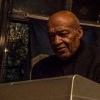
Overton Berry
pianoPhoto Credit: Lisa Hagen Glynn
Tags
Profile
John Bishop
Paul Rauch
United States
Washington
Spokane
Ray Charles
Quincy Jones
Ernestine Anderson
Jelly Roll Morton
Joe Venuti
Larry Coryell
Julian Priester
randy brecker
Art Lande
Gary Peacock
Jerry Granelli}, {{Jim Knapp
Denney Goodhew
Dave Peterson
Floyd Standifer
Bill Ramsey
Hadley Caliman
Buddy Catlett
Lee Konitz
benny golson
George Cables
Kenny Werner
Jeff Johnson
Rick Mandyck
Jay Thomas
John Stowell
New Stories
Marc Seales
Doug Miller
Don Lanphere
ernie watts
Bud Shank
Mark Murphy
Matt Jorgensen
Jessica Williams
Chano Dominguez
Hal Galper
Bill Evans
Steve Ellington
Jerry Bergonzi
Scenes
John Coltrane
Dexter Gordon
Carter Jefferson
Overton Berry
20 Seattle Jazz Musicians You Should Know
Comments
PREVIOUS / NEXT
John Bishop Concerts
Sep
23
Tue
Freefall
Seattle Jazz FellowshipSeattle, WA
Oct
7
Tue
Freefall
Seattle Jazz FellowshipSeattle, WA
Oct
11
Sat

Francesco Crosara Quartet
Frederick Holmes & Co. Art GallerySeattle, WA
Oct
21
Tue
Freefall
Seattle Jazz FellowshipSeattle, WA
Nov
4
Tue
Freefall
Seattle Jazz FellowshipSeattle, WA
Nov
18
Tue
Freefall
Seattle Jazz FellowshipSeattle, WA
Dec
2
Tue
Freefall
Seattle Jazz FellowshipSeattle, WA
Dec
16
Tue
Freefall
Seattle Jazz FellowshipSeattle, WA
Support All About Jazz
 All About Jazz has been a pillar of jazz since 1995, championing it as an art form and, more importantly, supporting the musicians who make it. Our enduring commitment has made "AAJ" one of the most culturally important websites of its kind, read by hundreds of thousands of fans, musicians and industry figures every month.
All About Jazz has been a pillar of jazz since 1995, championing it as an art form and, more importantly, supporting the musicians who make it. Our enduring commitment has made "AAJ" one of the most culturally important websites of its kind, read by hundreds of thousands of fans, musicians and industry figures every month.
Go Ad Free!
To maintain our platform while developing new means to foster jazz discovery and connectivity, we need your help. You can become a sustaining member for as little as $20 and in return, we'll immediately hide those pesky ads plus provide access to future articles for a full year. This winning combination vastly improves your AAJ experience and allow us to vigorously build on the pioneering work we first started in 1995. So enjoy an ad-free AAJ experience and help us remain a positive beacon for jazz by making a donation today.

Seattle
Concert Guide | Venue Guide | Local Businesses
| More...




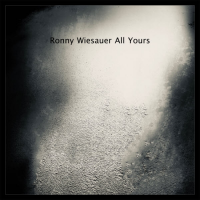

 Buy Now
Buy Now





